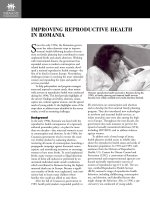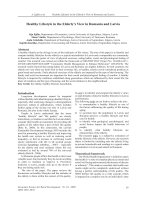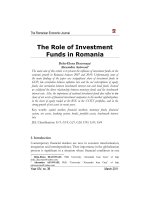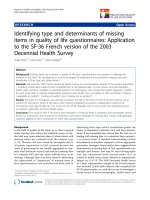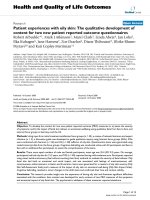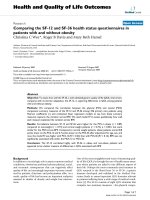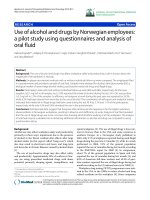Multicom questionnaires romania
Bạn đang xem bản rút gọn của tài liệu. Xem và tải ngay bản đầy đủ của tài liệu tại đây (109.25 KB, 18 trang )
Multicom project
Romanian questionnaires
Stefan Oltean
UNIVERSITATEA
BABES-BOLYAI
CLUJ-NAPOCA
– to identify specific multilingual communication skills or
activities needed in various professional settings, as well as
the extent to which they are recognised by companies and
organisations, and the way former graduates perceive their
importance.
– 27 questionnaires were administered to representatives of
public or private companies and organizations (firms,
national and international trading societies, societies that
offer language-related servicies, whose major field is
translation, retail stores, manufacturing firms, distribution
and transporting companies, marketing and media
institutions, travel agencies, real estate consultancy
services, higher education institutions, cultural centres and
institutions, museums, and financial services or institutions,
in Cluj, Bucharest and various cities in Transylvania) and to
former graduates.
Data collected from
- 10 questionnaires for businesses and
other organisations
- 11 questionnaires to former graduates
- 7 combined questionnaires
(businesses/organizations and
graduates)
The responses point to the following types of
activities requiring the use of foreign
languages:
•Commercial negotiations (phone, face to face, video
conferencing letters, e-mails),
•Meetings (organisation, note taking, minutes, interpretation)
•Information gathering (business intelligence)
•Content writing (Technical writing, Promotional writing,
website content...)
• Translation and/or localisation (average volumes?)
• Terminology (catalogues, in-house terminology,
standardisation, etc.)
The following type of activities requiring specific communication skills in
native language have been identified:
• translation, accountancy and firm administration
• sales activities
• commercial correspondence,
• marketing activities,
• presentations, promotion activities,
• communication with customers,
• meetings, local conferences,
• exhibition organization,
• text editing,
• activities for promoting local heritage for tourism;
• organization of activities with the public and mass-media,
• negotiations,
• letter writing, writing of official documents, of reports,
As for the most important overall qualities that are looked for in
the staff, the following have been mentioned:
– Communicative competence,
– team-work skills,
– ability to admit mistakes, to continually improve,
– initiative, earnestness, professionalism
– be dedicated to the jobs (workoholism),
– flexibility,
– capacity of working in teams dynamism,
– capacity of working under stress,
– to be punctual,
– organizational skills,
– correct conduct,
•
•
•
•
•
•
•
•
•
perseverence,
sociability,
responsibility
acceptance of new ideas,
scholarly competence, adherence to professional standards,
involvement in research activities;
negotiation skills,
performance in teaching,
professional standards
Depending on the profile of the job and company/organization.
The following skills are looked for in the staff when it comes to
using languages (including their native language):
• written and oral communication skills
• advanced knowledge of language and of culture
• good level of both Romanian and foreign languages for the
employees working in the administration or marketing
departments
• good communication skills
• good specialized language skills
• very good knowledge of spoken and written English,
• coherence, fluency, propriety of expression
• speaking, listening, writing, reading skills - (B2 level),
• computer literacy
Language proficiency certificates, own
evaluations are used by some
companies and organizations, but they
are not widespread. Some
organizations or firms (with a greater
share and importance of language
activities) require university qualification
in foreign languages.
• As for respondents (former graduates), they
hold positions ranging from officers in centres
for international cooperation, to
telecommunication engineers, cultural
assistants, client consultants in retail
department, managers of recruitment
services, web master editors, commercial
assistants, customer services officers, tourist
agents, Editor, Antena TV Station, process
assistants, administrators, museologists,
directors, academic staff in universities.
The following tasks and responsibilities have been identified:
Initiation and monitoring of international institutional cooperation
(agreements, programmes, conferences, summer schools,
etc.), test administration, conference and cultural events
organization, front office activities, recruitment of poersonnel,
linguistic treatment of web sites, sales of tourist packages,
designing of tv broadcasts, handling of the accounts of
businesses that place orders with firms, analysis of their
situation, coordination of archeological diggings, inventories of
ancient findings, editing of scholarly articles, coordination of the
activities of associations, Real estate consultancy, teaching at
the university.
The respondents rank most university qualification : BA degree in
languages (most frequent, mainly in AML), marketing,
engineering, psychology, law
MA degree in language and civilization, media communication
PhD
As for the institutions these respondents graduated from, the
following have been listed: Babes-Bolyai University, the Faculty
of Letters mainly, but also psychology, law and archeology;
Dimitrie Cantemir Christian University, Cluj (private), The
Technical University, Cluj; Université Michel de Montaigne,
Bordeaux3; Cornell University, English.
The following languages have been studied or acquired
by the respondents: English, French, Italian, German,
Spanish, Russian, Romanian, Hungarian; Latin and
Old Church Slavonic are also listed (archeologistis,
museologistis.
The foreign languages used in their jobs areRomanian,
English, French, German, Italian, Spanish,
Hungarian, with English occupying the first position
from among the foreign languages in terms of
frequency, and French and German, the second
position.
• The above languages are used for metings,
telephone, travel, information gathering, PR,
conferences, exhibitions, consultancy,
publications, written reports, conference
organization, translations, web design.
• Most respondents use all the four skills
(speaking, listening, reading, writing), but
listening and speaking, followed by writing are
more frequent frequent.
The respondents list knowledge of language and culture
as important for their job, followed by job related
culture and communication.
Other skills are mediation skills, skills for understanding
oral communication, speaking/conversational skills,
good knowledge of mother tongue, computer literacy
(knowledge of “Word” and “Windows”, for example),
knowledge of basic business terms, text editing, skills
for organizing activities with the public and massmedia activities, pronunciation skills, negotiation
skills, kindness, tolerance, translation skills, business
and marketing skills, which rank high in the
questionnaire answers.
In light of the knowledge requirements and skills necessary for the
new language related jobs and professions, the respondents
make several suggestions relating to the issue of changes in
university language degree programmes. In this respect, they
indicate
•
•
•
•
the need to develop skills for understanding oral communication,
To develop speaking skills in the foreign language, emphasis on
conversation, and pronunciation,
the need for international programmes allowing students to spend
training periods abroad,
more courses on business language, programmes that give students
the option of achieving an education that would prepare them for a
business environment
• teaching of foreign languages throughout the entire
training cycle
• Teaching of foreign languages in all faculties,
• teaching of specialized topics
• Emphasis on debates and practical tasks,
• Encouragement of students to obtain international
language certificates
• tutorial system that enables students to make rapid
progress in the acquisition of academic (technical)
language
• development of intercultural programmes
• no changes
Questionnaires
Grad_1
Grad_2
Graduates_and_business_combined_1
Business_1

